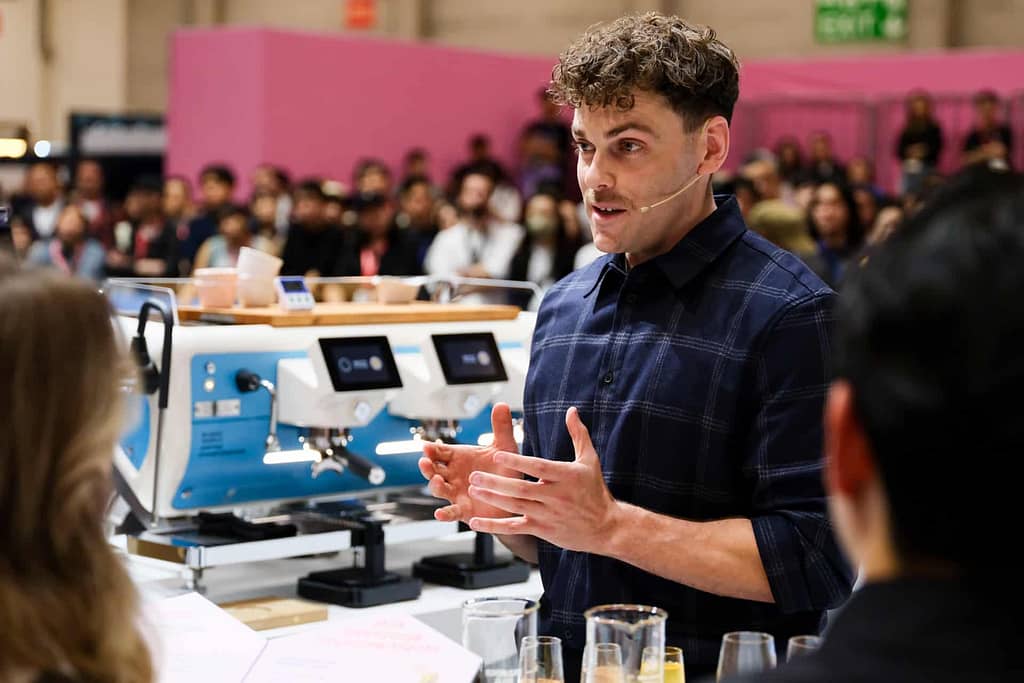[[{“value”:”
Australian competitor Jack Simpson of Axil Coffee has earned second place in the 2024 World Barista Championship (WBC), which took place at World of Coffee from 1 to 4 May in Busan, Korea.
This was Jack’s second WBC experience after placing third in the 2023 competition. He missed out on the top spot by a single point to Mikael Jasin of Indonesia.
“Personally, I’ve poured my heart and soul into this routine over the last six months. Falling short by one point stings, but that is competition. I’m so grateful to have the honour to represent Australia on the world stage, not just once but twice. I hope I did justice to the community that has inspired me so much,” Jack said post-competition.
Jack’s routine focused on the pursuit of constant improvement.
“After years of competing, that constant drive to be perfect was actually filling me with anxiety. So much so, I even thought about not competing this year,” Jack told the judges. “But then I realised, the pursuit of perfection wasn’t actually helping, it was hindering me. Today, I set out not to be perfect, but to simply be better than I was last year.”
In his espresso course, Jack used a nitrogen macerated geisha coffee, courtesy of producer Jamison Savage of Finca Deborah in Volcan, Panama.
For his espresso, Jack described the tasting notes of blood orange, yellow, peach, black cherry, and an aftertaste of brown sugar, with a medium weight, juicy texture, and lingering rich finish.
Jack’s espresso recipe consisted of 20 in, 45 out for 29 seconds.
To gently distribute his ground coffee in the portafilter, Jack used the AutoComb, a refinement of the Weiss Distribution Technique with a geared handle and 13 needles.
Jack also applied 50 hertz of vibration on a vibrating table to gently disperse his coffee particles vertically and horizontally before tamping his coffee. This helped to achieve a higher extraction yield, a more balanced espresso, and contributed to the juicy texture.
For his milk course, Jack used a pacamara coffee from Jhonatan Gasca of Finca Zarza in Colombia. He used a recipe of 21 grams in, 35 grams out in 25 seconds. He used a combination of 90 per cent full cream milk waved for two hours and 10 per cent cryodesiccation coconut milk.
“The addition of coconut milk provides a rich sweetness to this coffee,” Jack said in his performance.
Jack described the flavour profile as “sweet cherry, melted chocolate ice cream, and shaved coconut”.
For his signature drink, Jack used a combination of the geisha and pacamara coffees. He used 80-millilitres of distilled peach honey using a rotary evaporator with a vacuum pump. This allowed Jack to collect the hydrosol, which is the water that’s normally lost through regular distillation. He added 80-millilitres of this to his drink. He then added 100-grams of chinotto. These ingredients were paired with two espresso shots of the geisha and two shots of the pacamara coffee.
Jack described the tasting notes of mango, passionfruit, dried apricot, and orange soda.
“The path of constant improvement has made me look at coffee like a puzzle,” Jack told the judges in his closing address. “Not one giant picture, but those individual pieces. Those pieces have turned into collaborations that can have potential impacts in the industry. As I stand here today, I’m a better barista than I was last year. Next year, I’ll improve even more. Because once on this path of constant improvement, it isn’t about being perfect, it’s about the journey.”
Jack called time at 14 minutes and 56 seconds in his final performance.
“The judges were able to experience the highest level of coffee passion as well as the expertly made drinks in the heartfelt and engaging presentations these experts shared on stage,” says Scott Conary, WBC Head Judge.
“The level just keeps increasing every year as baristas embrace innovation along with their desire to keep our industry improving in every aspect, with the competition stage acting as a forum for sharing these ideas and the coffee preparations proving their points with tangible evidence.”
“}]]


